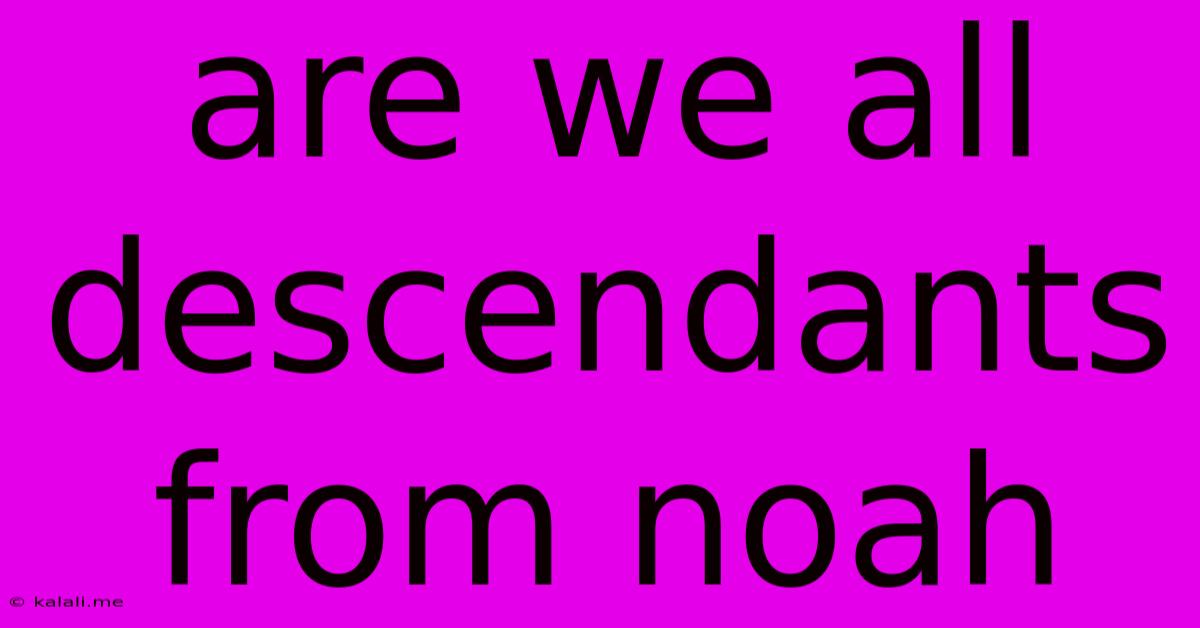Are We All Descendants From Noah
Kalali
Jun 06, 2025 · 3 min read

Table of Contents
Are We All Descendants of Noah? Exploring the Biblical Narrative and Scientific Evidence
The question of whether all humans are descendants of Noah, as described in the Book of Genesis, is a complex one, sparking debate among theologians, historians, and scientists. This article explores both the biblical account and the scientific evidence, aiming to provide a balanced perspective on this fascinating topic. The core question delves into the genetic bottleneck theory and its correlation with the biblical flood narrative. Ultimately, a clear answer remains elusive, highlighting the intersection of faith and scientific understanding.
The Biblical Account: A Global Flood and a Family's Survival
The Book of Genesis recounts a devastating global flood, where only Noah, his family (his wife, three sons – Shem, Ham, and Japheth – and their wives), and pairs of every animal survived aboard the Ark. This narrative positions Noah's family as the ancestors of all subsequent humanity. The biblical text presents this as a complete reset of the human population, with all current lineages stemming from this single family. This interpretation is central to many religious beliefs and understandings of human history. The idea of a single ancestral family significantly impacts interpretations of human origins and diversity.
Scientific Evidence: Genetic Diversity and Human Origins
Scientific research paints a more nuanced picture. Genetic studies, particularly focusing on mitochondrial DNA (mtDNA) – inherited solely from the mother – and Y-chromosome DNA (passed down the paternal line), reveal a significant degree of human genetic diversity. While tracing a single ancestral pair is not supported by this research, the discovery of a relatively recent common ancestor for all humans is widely accepted within the scientific community. However, the timeframe and the precise nature of this common ancestry differ significantly from the biblical account's timeframe. The genetic evidence suggests a much longer and more complex process of human evolution and migration across the globe, involving various populations and genetic exchanges. The concept of a recent mitochondrial Eve and a recent Y-chromosomal Adam reflects this scientific understanding, but it doesn't necessarily align with the biblical narrative of Noah's Ark.
Reconciling Faith and Science: Different Perspectives, Shared Humanity
The differing perspectives – the biblical narrative of a singular ancestral family and the scientific evidence pointing towards a more complex and extended process of human evolution – present a challenge for reconciliation. For many, faith and scientific understanding exist in separate spheres, with the biblical account seen as a spiritual truth rather than a literal historical record. Others attempt to reconcile the two, searching for allegorical meanings within the biblical narrative or proposing interpretations that bridge the gap between faith and scientific findings. Regardless of individual beliefs, the shared humanity of all people remains a unifying concept, irrespective of the specific interpretation of origins.
Exploring Further: The Bottleneck Effect and its Implications
One avenue of exploration involves the genetic concept of a population bottleneck. A severe reduction in population size can lead to a decrease in genetic diversity. Some interpret the biblical flood as a potential population bottleneck event, leading to reduced genetic diversity in the surviving population. While this idea is intriguing and provides a possible link between the biblical narrative and some genetic observations, it doesn't fully account for the significant genetic diversity observed in modern human populations.
Conclusion: An Ongoing Dialogue
The question of whether we are all descendants of Noah remains a matter of faith and interpretation. The biblical account offers a powerful narrative of survival and renewal, while scientific evidence suggests a more complex and protracted history of human origins. Both perspectives offer valuable insights into our understanding of humanity, its past, and its future. The ongoing dialogue between faith and science continues to enrich our understanding of our place in the world. The discussion regarding the genetic implications of a potential population bottleneck, while intriguing, needs further research and careful consideration within a wider evolutionary context.
Latest Posts
Latest Posts
-
Mac Fix Or Merge Mp4 Files
Jun 07, 2025
-
R Change A Matrix Columns And Rows
Jun 07, 2025
-
Non Inverting Vs Inverting Op Amp
Jun 07, 2025
-
Fallout 4 Dogmeat Sanctuary Hills Location
Jun 07, 2025
-
Baptism Of The Holy Spirit Verses
Jun 07, 2025
Related Post
Thank you for visiting our website which covers about Are We All Descendants From Noah . We hope the information provided has been useful to you. Feel free to contact us if you have any questions or need further assistance. See you next time and don't miss to bookmark.